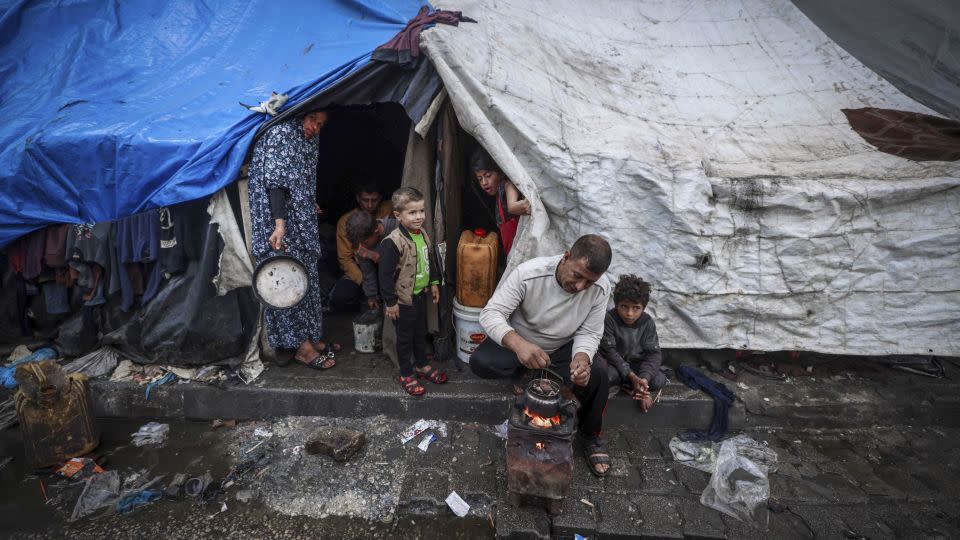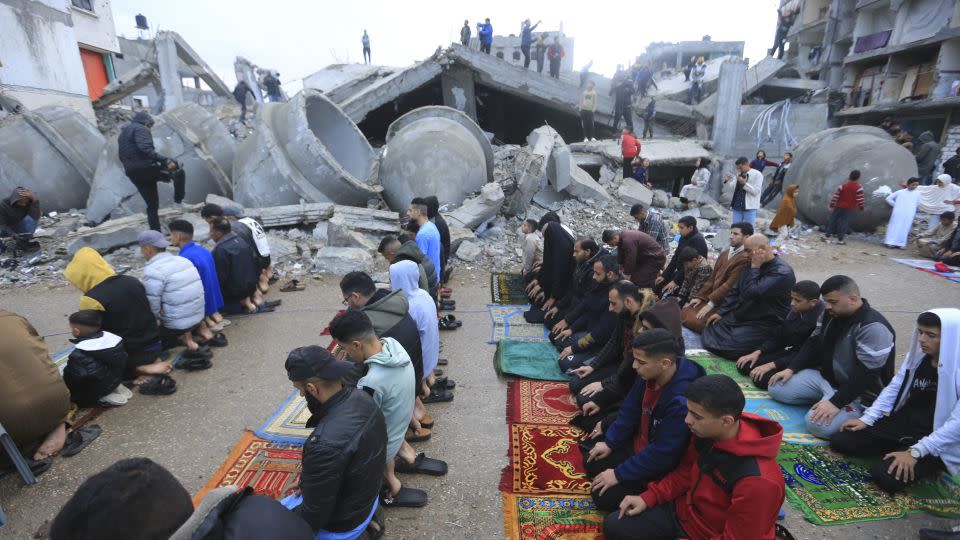‘There is no joy:’ Palestinians mark Eid in destroyed mosques and homes, as Israel’s war in Gaza rages
Mohammad sits on the back of a donkey-drawn cart, trundling down what is left of a road, alongside the few belongings he managed to retrieve from his flattened home. Wednesday should have marked the celebration of Eid al-Fitr; instead, it is another reminder of what millions in Gaza have lost.
“We are spending the Eid in the tent – where else will we spend it?” he told CNN. “I never expected in my life to spend Eid like this.”
Mohammad has just returned to Khan Younis, the central Gaza city that the Israel Defense Forces (IDF) bombarded for months until their withdrawal Sunday.
Nearby, another man has just picked through the belongings in his own destroyed house. He grabbed his daughter’s Eid clothes as he went, even though she won’t be able to wear them.
“We are alive for Eid, thank God,” he said. “We were alive for Ramadan, but it was a time of exhaustion and devastation.”
Muslims gather at Eid al-Fitr to mark the end of Ramadan and show gratitude to Allah. People in Gaza, as across the Muslim world, would typically celebrate the day by meeting with their families and sharing large meals.
But this year homes across the enclave lie in ruins, and all 2.2 million people in Gaza do not have enough food to eat, with half of the population on the brink of starvation, according to a UN-backed report published last month.
Israel’s war in Gaza has killed more than 33,400 Palestinians – the majority of whom are women and children – according to the Ministry of Health in the enclave. More than 76,000 people have been injured.

“Eid right now is basically dead. There is no joy, no delight,” said Ahlam Saleh, who was displaced from northern Gaza in the early stages of Israel’s war with Hamas and has since been living in Deir al Balah, in the center of the strip.
“Kids are going to wake up to Eid today without parents,” she told CNN. Saleh has joined with other women in Deir al Balah to bake ka’ak, biscuits traditionally eaten during Eid festivities, for the city’s children. “We are trying to make our kids happy, make those around us happy, remind them of the smell of Eid,” she said. “We have nothing else to give the kids except this.”
This is an Eid unlike most Gazans can remember. A true celebration is virtually impossible anywhere in the enclave, where the UN says more than 70% of homes have been damaged or destroyed since October.
There was once hope that a ceasefire could be agreed before Ramadan began. Instead, Muslims fasted throughout the month-long holiday despite the ongoing terrors of war; and now Eid is also taking place under the cloud of a conflict in its seventh month.
But Muslims in Gaza are marking the holiday with a mix of apprehension and defiance.

“Our presence here is a message to the enemy and to the world that we will celebrate Eid despite the bloodshed and devastation,” said a man in Jabalya, northern Gaza, where prayers took place in the elements. “We came here to pray outside in the rain for Eid to revitalize the energy within us… and to be with the martyrs,” a woman added.
One tradition that is more palpable than ever is Eid’s custom of commemorating the dead. Mourning women in Deir al Balah marked the holiday around freshly dug soil, where their husbands and sons, killed in the war, lay.
Um Ahmad came with her children to visit her husband’s grave. Nodding towards her son, she said: “This little one was banging on the stone, saying, ‘I want to see Baba. Who is going to celebrate Eid with me like Baba used to?’”
And in Rafah, the city in southern Gaza where many have fled, but where an IDF offensive is anticipated, a father told CNN it was “very far from (an) Eid atmosphere this year, with all the airstrikes and bombing.” With prices for essential goods soaring, he has been unable to buy his children traditional Eid clothing.
Israeli Prime Minister Benjamin Netanyahu said Tuesday that “no force in the world” will stop Israeli troops from entering Rafah, where 1.5 million people are sheltering.
But Mostafa Alhelou, who was displaced from Gaza City to Rafah, said he and other Muslims “insisted” on praying inside Al-Farouq mosque, which was destroyed by Israeli bombardment, “so the world knows that we are holding onto our mosques, to our land, to our country.”
“Hopefully next Eid, we will celebrate it in Gaza City and pray inside the mosques we are used to praying in,” Alhelou said.
For more CNN news and newsletters create an account at CNN.com

